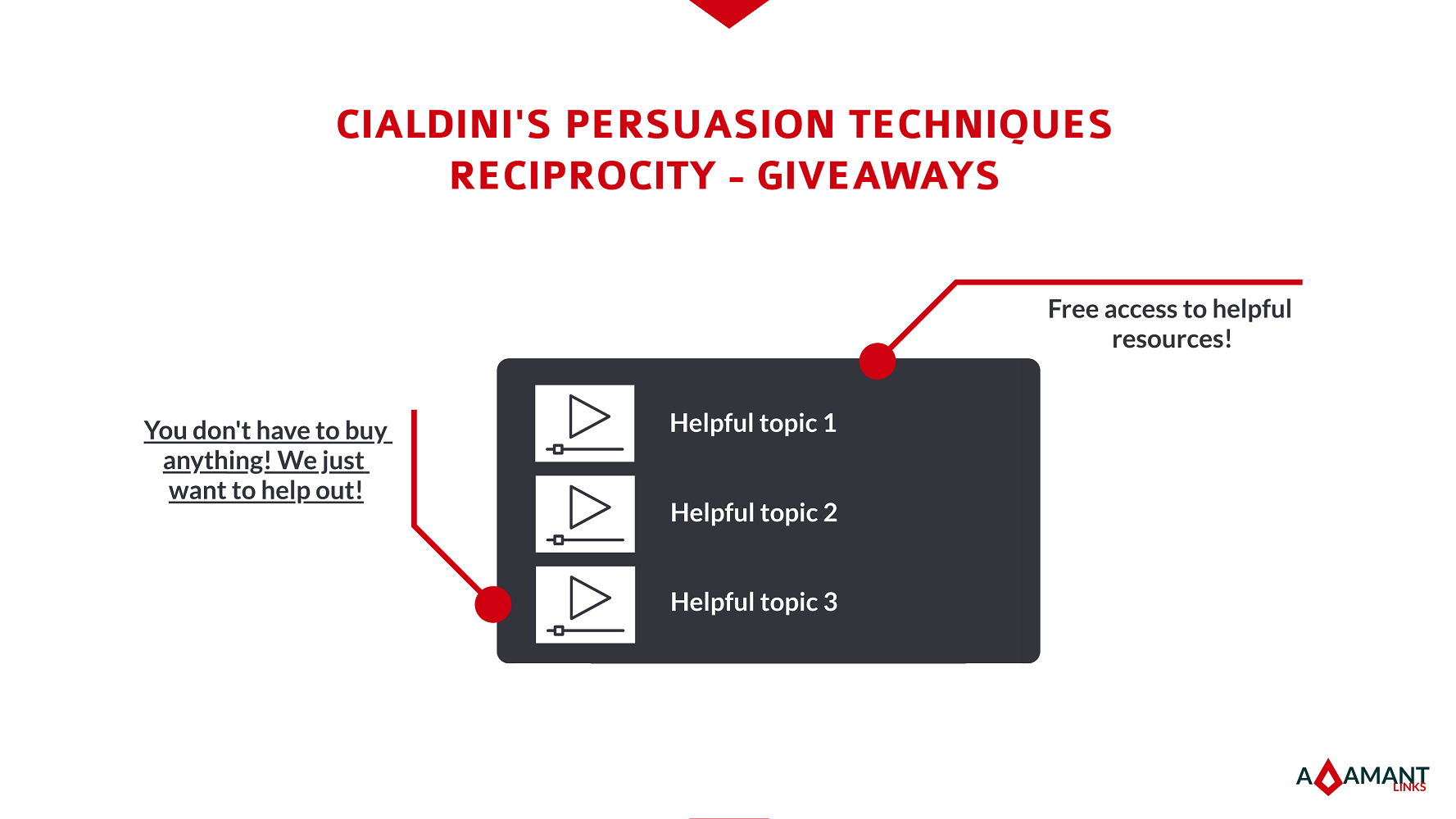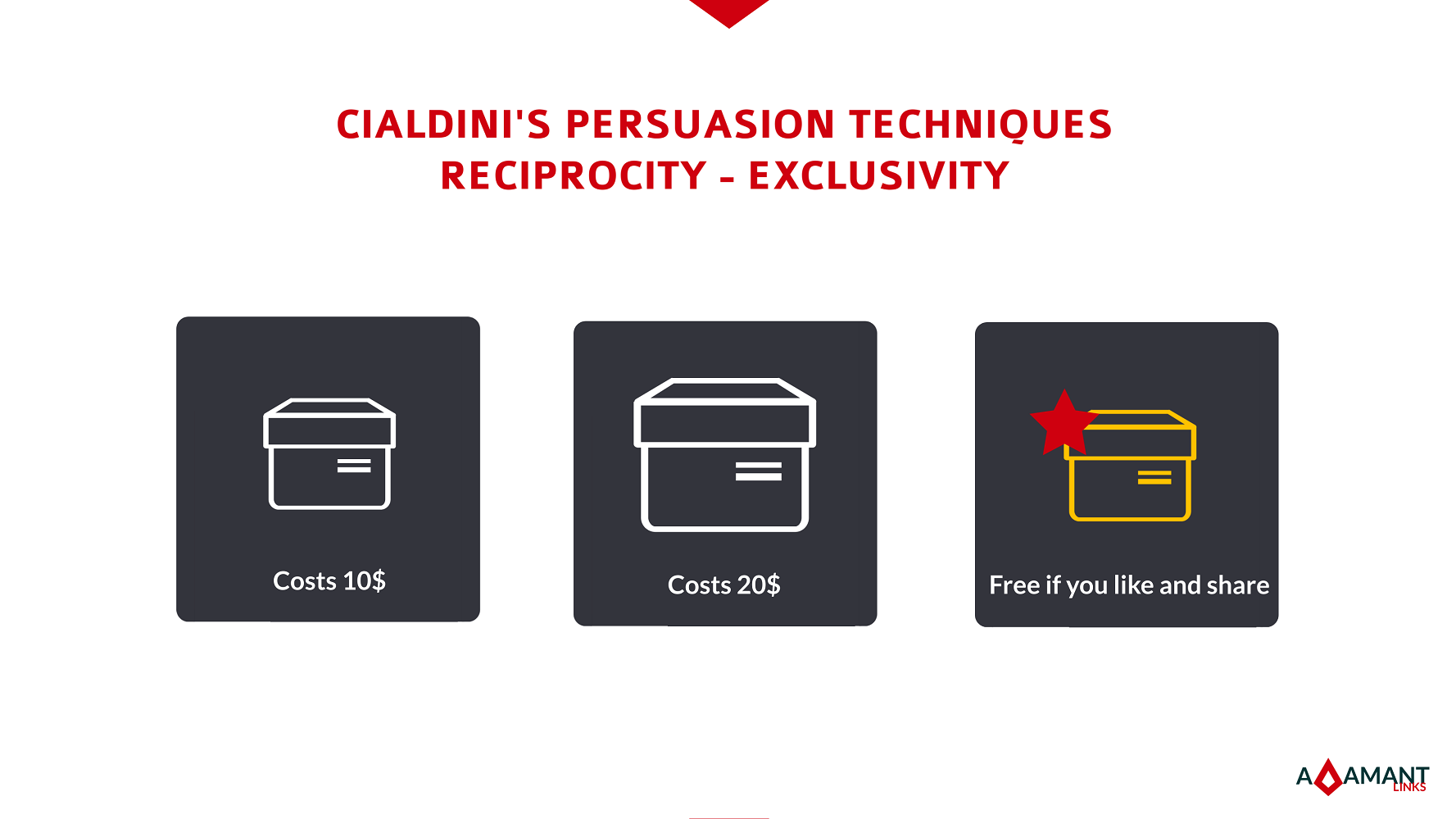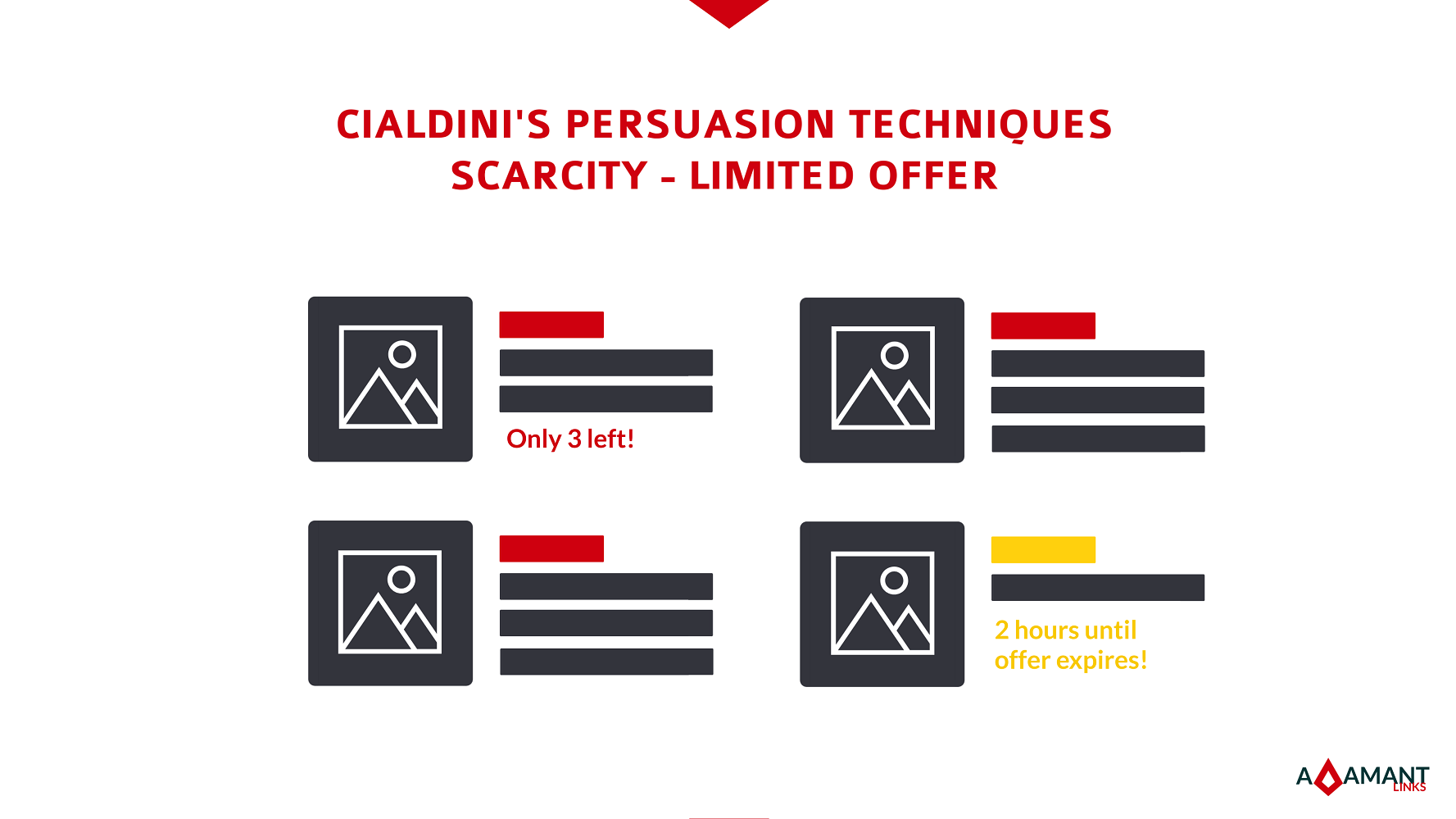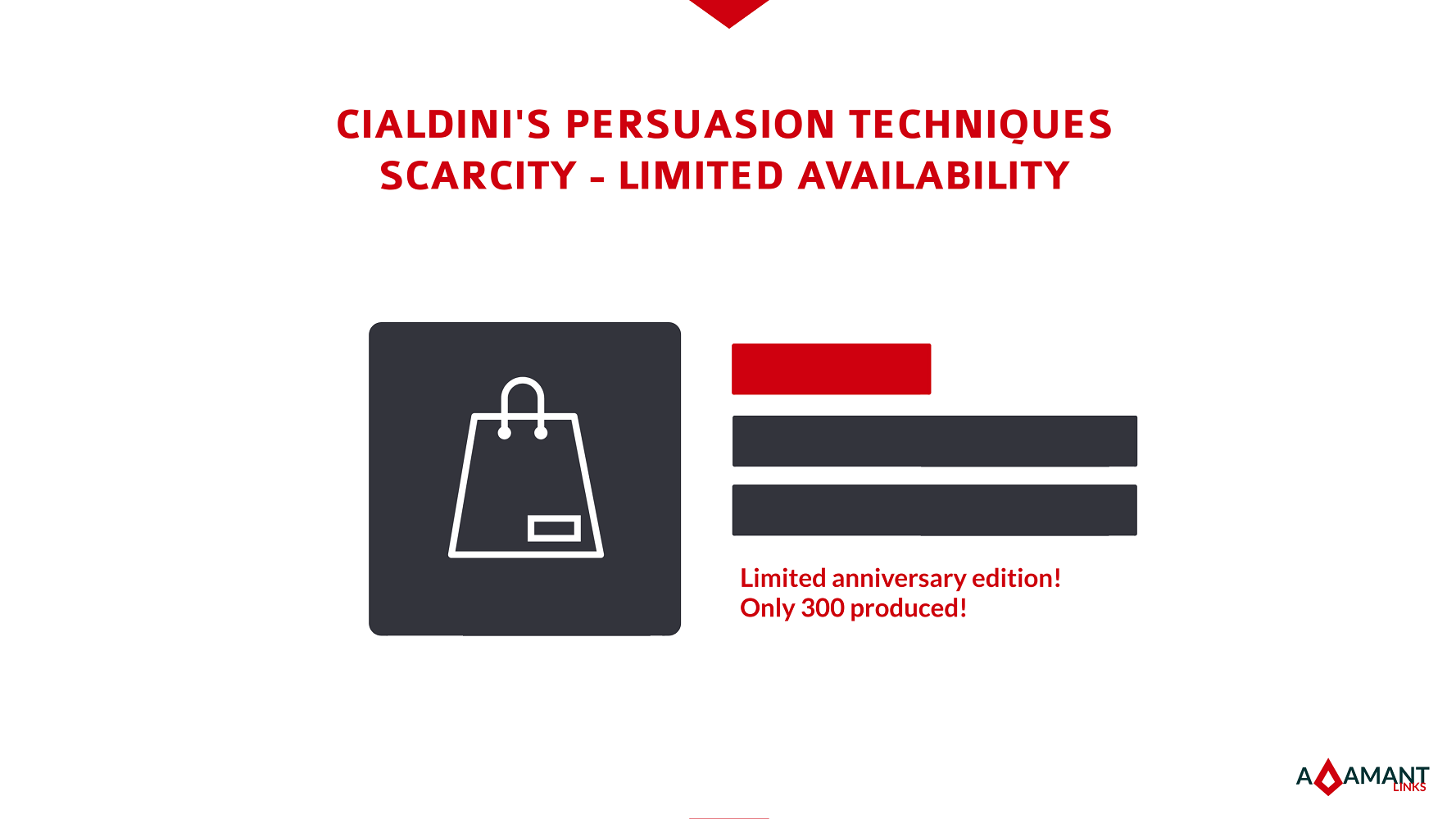by Vlad Ungureanu
Aug 2020
Reciprocity
People have a tendency to pay back favours done to them. The idea of reciprocity says that people, by nature, feel obliged to provide discounts or concessions to others if they’ve received favours from those people. Psychology explains this by stressing that humans simply hate to feel indebted to others.
For example, let’s say that you’re running a popular blog that offers readers highly actionable and practical information to improve their lives. All of this information is offered for free to site visitors. Based on the idea of reciprocity, your blog makes site visitors more likely to feel obligated to buy something from your site, providing you with an eventual conversion.

Adamant Links - Cialdini's Persuasion Techniques - Reciprocity: Give Aways
Basically, in order to employ "Reciprocity" you need to offer something first. The most common benefits provided are discounts, information or personalisation. It is a common marketing strategy for companies to provide courses, infographics, lectures, case studies or even "unique magic formula to increase X" for free. Not only does this drive traffic to the site, but it also creates a reciprocity context for your potential customer. If the provided benefit proves helpful, then the potential customer would be more likely to also purchase something. "Content Marking" is also a great example of this concept.

Adamant Links - Cialdini's Persuasion Techniques - Liking: Exclusivity
Not all business can provide something highly valuable, either due to the nature of their business, limited funds or lack of access to constructive materials. The alternative to providing a benefit is to provide some form of exclusivity. For example, recommending a service to a friend is rewarded with a special or expensive benefit (exclusive access to enterprise features, limited access to paid content, larger storage, greater number of uses of a specific service and so on).
Finally, if you cannot get a person to visit your site to receive a benefit, and you cannot reward them for a specific beneficial action you can always send them a present. This has the similar effect to the other "Reciprocity" strategies, as long as they know that it is from you. For example, in the last month Play Station Network has been randomly giving PSN credits as gifts to their customers, while during the start of the pandemic they gave out multiple free games and considerable discounts to accommodate people staying more in their homes. Hygiene and beauty brands conduct gift giving campaigns in person, by mail or in speciality magazines, as samples almost every year. People that pre-order games, hardware or electronics receive all sorts of bonuses, memorabilia, discounts or presents. Another widely adopted gift giving strategy is ever-present at conferences, where companies give away branded pens, notebooks, stress balls, gift bags, t-shirts and many other things in the hopes of obtaining "Reciprocity".
People high in Conscientiousness or Agreeableness are most likely to respond to this technique. Conscientious people are less likely to be or feel in dept and through their organized and disciplined nature they tend to reciprocate. Agreeable people are highly socially aware, modest and polite and as such have a strong tendency to return the favour.
Note, that the other personality profiles have a limited, but positive response to "Reciprocity". Due to a variety of factors (social norms, values, education, functional social skills, emotional intelligence, empathy and many others) the other personality profiles might also feel the need, sometimes, to respond to "Reciprocity".
Scarcity
The rarer a product is, the more people want it, or at least this is what most people believe. This means people are more likely to desire or demand a product if they are told it is hard to get. Scarcity is the perception that products are more attractive when their availability is limited. We are likelier to purchase something if we’re informed that it’s the "last one" or that a "special deal" will soon expire. In short, people hate to miss out, and that fear is a powerful motivator to encourage them to act quickly. Scarcity is one of the most popular Cialdini principles. Companies use it over and over again to try to boost conversions.

Adamant Links - Cialdini's Persuasion Techniques - Scarcity: Limited Offer
Many booking sites employ the scarcity principle in many ways: "Only Today 35% off!", "X people are looking at the same offer right now!" or "In very high demand – only X rooms left on our site!". This approach also serves as an indirect "Social Consensus" as it implies that the product or service is so good that is almost sold out. Other business, like retailers, provide time limited discounts on various products. It is very common to see counters or notifications that inform the visitor that a specific price or offer will expire in a specific time interval.

Adamant Links - Cialdini's Persuasion Techniques - Scarcity: Limited Availability
In some cases, real scarcity can be used to increase value and conversion rates. For example, luxury brands, where handmade/crafted items can be produced in limited amounts, really benefit from this technique. In other cases, simulating scarcity is also possible (for example, in the fashion industry) by not selling or discounting seasonal products. In this manner, even abundant products become scarce.
While this technique is widely used, only people Open to Experience and Extroverts might be persuaded by it, due to their desire to not miss out on something that is interesting or new. Extroverts tend to respond positivity to this technique when it comes to travel or social events, due to their gregarious nature. They might also respond to the limited availability of luxury brands (that are unique or rare), but rarely respond to the scarcity persuasion technique related to common purchases.
People high in Conscientiousness or Neuroticism do not respond well to this technique. Both personality types prefer to have sufficient time to evaluate the risks and utilitarian aspects of a purchase.
References:
- "Investigation of the Influence of Personality Traits on Cialdini’s Persuasive Strategies", Kiemute Oyibo , Rita Orji and Julita Vassileva, 2017
- "Psychological targeting as an effective approach to digital mass persuasion", S. C. Matza, M. Kosinskib, G. Navec and D. J. Stillwelld, 2017
- "Investigating the Role of Personality Traits and Influence Strategies on the Persuasive Effect of Personalized Recommendations", Gkika Sofia, Skiada Marianna, Lekakos George and Kourouthanasis Panos, 2016
- "Personalized Persuasion: Tailoring Persuasive Appeals to Recipients’ Personality Traits", Jacob B. Hirsh, Sonia K. Kang, and Galen V. Bodenhausen, 2012
- "Big Five Personality Traits and Responses to Persuasive Appeals: Results from Voter Turnout Experiments", Alan S. Gerber, Gregory A. Huber, David Doherty, Conor M. Dowling, Costas Panagopoulos, 2012
- "The Impact of Individual Differences on Influence Strategies", N. Alkis and T.T. Temizel, 2015
Coming soon:
Psychographics and Ad Tergeting - Part 1
-
Market Segmentation: Overview
FEB 2020 -
Market Segmentation: Demographics
MAR 2020 -
Market Segmentation: Geographic Location
MAR 2020 -
Big Five/OCEAN Personality Model
JUN 2020 -
Psychographic Segmentation
JUL 2020 -
Psychographics and Biological Gender
JUL 2020 -
Psychographics and Age
JUL 2020 -
Psychographics and Other Demographic Segments
JUL 2020 -
Psychographics and Individual Preferences
AUG 2020 -
Psychographics and Internal Values
AUG 2020 -
Psychographics and Shopping Motivation
AUG 2020 -
Psychographics and Social Media - Part I
AUG 2020 -
Psychographics and Social Media - Part II
SEP 2020 -
Psychographics and Persuasion - Part I
MAR 2021 -
Psychographics and Persuasion - Part II
APR 2021 -
Psychographics and Persuasion - Part III
APR 2021